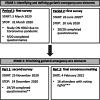A consensus statement on minimum operational standards for geriatric emergency care in Belgium: a modified Delphi study
- PMID: 37993796
- PMCID: PMC10666396
- DOI: 10.1186/s12877-023-04474-0
A consensus statement on minimum operational standards for geriatric emergency care in Belgium: a modified Delphi study
Abstract
Background: As emergency department (ED) leaders started integrating geriatric emergency guidelines on a facultative basis, important variations have emerged between EDs in care for older patients. The aim of this study was to establish a consensus on minimum operational standards for Geriatric ED care in Belgium.
Methods: A two-stage modified Delphi study was conducted. Twenty panellists were recruited from Dutch and French speaking regions in Belgium to join an interdisciplinary expert panel. In the first stage, an online survey was conducted to identify and define all possible elements of geriatric emergency care. In the second stage, an online survey and online expert panel meeting were organized consecutively to determine which elements should be recognized as minimum operational standards.
Results: Between March 2020 and February 2021, the expert panel developed a broad consensus including ten statements focusing on the target population, specific goals, availability of geriatric practitioners and quality assurance. Additionally, the expert panel also determined which protocols, materials and accommodation criteria should be available in conventional EDs (39 standards) and in observational EDs (57 standards).
Conclusions: This study presents a consensus on minimum operational standards for geriatric emergency care in two ED types: the conventional ED and the observational ED. These findings may serve as a starting point towards broadly supported minimum standards of care stipulated by legislation in Belgium or other countries.
Keywords: Emergency department; Geriatric emergency medicine; Observation unit; Older adults.
© 2023. The Author(s).
Conflict of interest statement
The corresponding author, Koen Milisen, is senior editorial board member of BMC Geriatrics. He was not involved in the editorial process of the current paper. All other authors declare that they have no competing interests.
The abstract of this study was accepted and presented as a poster presentation at the 45th Winter Meeting of the Belgian Society for Gerontology and Geriatrics (Oostende, Belgium; 24 June 2022). For that reason, the abstract of this study was also published as a congress abstract (
Figures

References
-
- Kahn JH, Magauran BGJ, Olshaker SO. Geriatric Emergency Medicine: principles and practice. New York: Cambridge University Press; 2014.
-
- Schnitker L, Martin-Khan M, Beattie E, Gray L. Negative health outcomes and adverse events in older people attending emergency departments: A systematic review. Australas Emerg Nurs J. 2011;14:141–162. doi: 10.1016/j.aenj.2011.04.001. - DOI
-
- Carpenter CR, Shelton E, Fowler S, Suffoletto B, Platts-Mills TF, Rothman RE, et al. Risk factors and screening instruments to predict adverse outcomes for undifferentiated older emergency department patients: a systematic review and meta-analysis. Acad Emerg Med. 2015;22:1–21. doi: 10.1111/acem.12569. - DOI - PubMed
Publication types
MeSH terms
Grants and funding
LinkOut - more resources
Full Text Sources
Medical
Research Materials

